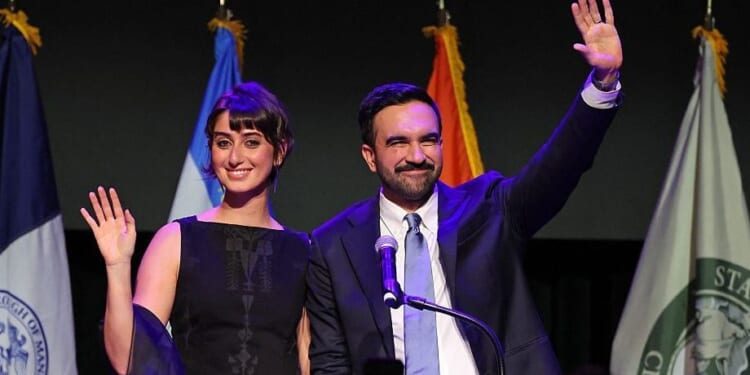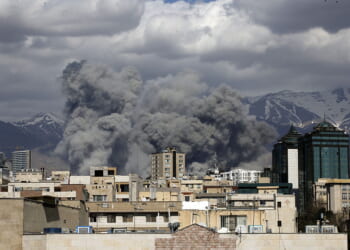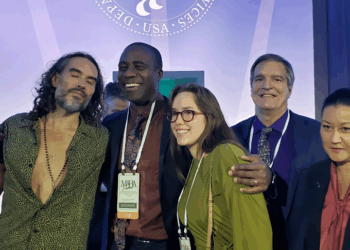On the night of the New York mayoral election, the young middle-class Manhattanites were out in full force at every bar with a TV. Naturally, I was there too. It was a tragicomic evening: all I saw were Gen Z women, eyes squinting at CNN in poses of exaggerated anxiety, fawning over Zohran Mamdani. I don’t believe any of them were born in the city: most seemed to be arts majors shipped in from comfortable Middle America. When the results rolled in, a group of four golden-blondes — who’d spent the evening trying very sincerely to relate to the disgruntled and indifferent barman — swiveled around and raised their shots to the room. Spotting my friend and I and evidently taking my leopard-print jacket as a sure sign of solidarity, they yelled “Mamdani?”. “I can’t vote,” I replied. Best not to get into it, eh?
If these are Mamdani’s biggest fans — he performed best among what New Yorkers grimly call “transplants” — then I have no doubt that his appeal to well-meaning, well-heeled Zoomers is bolstered by the presence of his very chic, very right-on wife. Rama Duwaji is a bobbed artist born in Houston (though her Instagram bio protests “from Damascus”) who ranges, according to the resident babe-raters of X, from a sulky, pouting narcissist to a Princess Diana-level national treasure. At 28, she is at the top end of Gen Z; she met her husband on Hinge and wore knee-high black boots on her wedding day. One Facebook post from a “digital creator” in the run-up to the election rhapsodised over her “high boots, bare shoulders … showing off her gorgeous legs with confidence”. This, it read, was the liberated modern Muslim couple “about to lead the most Zionist city on Earth” (ever heard of Tel Aviv?). It seemed Mamdani’s untested political talent was secondary to his wife’s decision to get her shoulders out.
This may seem like the logic of a deranged naïf, but aesthetics increasingly matter in politics. This is particularly true when the target voter is a social media native whose engagement with policy is restricted to what friends put on their Instagram stories. For young liberals, Duwaji’s look signals the promise of progressive politics: her haircut alone is shorthand for being on the right side of history. In the age of Maga mavens with long barrel curls, tangerine foundation and stiff faces, here is someone who looks like she belongs at a Ridgewood party, where she’d drink High Noons and discourse on prison abolition with other illustrator-activists and their software-engineer boyfriends.
To a certain kind of bright-eyed young professional, Duwaji is the model proletarian (aka just like me!): a veteran of dating apps with a cool but humble art job, where you churn out doodles of cats and hijabis, and a commitment to social justice sternly meted out on social media. A direct message on Instagram from weeks after the October 7 attacks shows that she was ticking people off for not advocating for Palestine online: “shift ur energy for speaking out about genocide!!!” Then, last month, she posted broken hearts on Instagram about the death of the Palestinian influencer Saleh al-Jafarawi (“beloved Jafawari”, she wrote), who had celebrated the October 7 attacks in a gleeful viral video. Duwaji embodies the ineffectual radicalism of young activist voters, sharing their frustration over “complicity” and “silence” which they presume is also held by the working masses. But Mamdani and his wife represent “the people” — those inconveniently conservative lumpens more interested in utility bills than the global intifada — about as much as King Donald Croesus represents the red states. That is, not at all.
“Mamdani and his wife represent ‘the people’ about as much as King Donald Croesus represents the red states. That is, not at all.”
Duwaji’s physical appearance has drawn ample attention since Mamdani’s victory. Luckily, she also seems to spend a lot of time obsessing over it — to the extent that her own face appears to be the principal subject of her art. X users have been uncharitable about her tendency to “self-insert” in her drawings, but the evidence is pretty damning: to my philistine eye, Duwaji’s style looks like the poorly drawn Wojak memes born on imageboards in the 2010s — except in the place of soyjacks, chuds and tradwives is… the artist herself. In one particularly egregious example, she draws a policeman kneeling on a brown woman’s neck; his handcuffs dangle over her keffiyeh. It’s difficult to escape the interpretation that, here, Duwaji was reimagining the murder of George Floyd except this time, she — or a woman who looked remarkably like her — was the star of the show.
Being a rubbish artist isn’t a problem in itself, but the spectacularly shallow social commentary this first lady’s illustrations provide is depressing indeed. What strikes me is how very 2020 the whole thing is: Instagram activism, fantasies of victimisation, nebulous “advocacy” which relentlessly centres the advocate. And, crucially, it’s all so oppressively cringe.
But this may be key to Duwaji’s fascination for a certain kind of voter: the politics of New York do skew embarrassingly earnest. When they enter Gracie Mansion in January, Mamdani and Duwaji will be at the helm of a city where quirky indie rebellion has long amounted to self-aware posturing. Here, the streets are awash with “wholesome chungus”, as one recent tweet put it: memelords tape onto lampposts flyers which invite passers-by to scan QR codes if they’re “looking for a hot performative male” or to “smoke a cigarette with me” in the West Village — all for the incomprehensible cause of being offbeat and, ominously, “creating”. Businesses, too, plaster NYC with vigilante graphic design: one poster on my road, in a corner where the fentanyl addicts huddle overnight, advertises a local dispensary with the tagline “weed made me gay”, along with emetic phrases like “toasted twink” and “puffing pansexual”. Duwaji is a hit here because her gauche art resonates with the city’s softcore radicalism, something which would be laughed out of the room in most of London.
The real problem, of course, is that what Mamdani and his coterie stand for makes no practical sense to the people they profess to be representing — the killer catch in many radical projects of recent years, including Corbynism and its grim sequel Your Party. Squiggly art about protests and soup kitchens may make Zoomer women feel good, but they might feel less aglow with solidarity when they can’t take the bus because their dreamboat mayor has made them free, turning them into mobile homeless encampments populated with dangerous and drug-addled men. Nor will fourth-wave feminists thank him when he makes social workers, rather than police, the first port of call for victims of domestic abuse — shunting battered women into a sluggish, bureaucratic nightmare instead of putting their partners in handcuffs. Nor will liberated “digital sex workers” selling nudes to supplement their income feel extra-empowered if Mamdani ultimately decriminalises prostitution, putting trafficked women entirely at the mercy of their pimps. Actually, scrap that last one — privileged feet-pic sellers never gave a toss about actual prostitutes.
New York’s next first lady will preside over the centre of the capitalist world, overseen by a husband whose objective is to diminish it. These are young globalists: Mamdani may have won on a campaign of local affordability (memorably including bringing down the cost of halal meals), but his politics revolve around other places, other battles, far from the five boroughs. Nobody better represents this unrootedness — from New York as a place and from the priorities of its residents — than Duwaji and her fan club. These are people stuck in perpetual protest, obsessively documenting their urge to “rage at the state of the world”, as she puts it. Because that protest is so tightly bound in their self-image as a little radical in an evil system, nuance doesn’t come easy; older or more moderate voters find this offputting. When you’re an angry young creative whose job is to draw pictures of other angry people for The New Yorker, you never face ideological compromise or challenges; when the messy reality of political office unfurls next year, we can expect to see this couple grow up fast. It will be fascinating to watch the Zoomer’s champion being, I suspect for the first time, around people with vast experience and complex views.

















